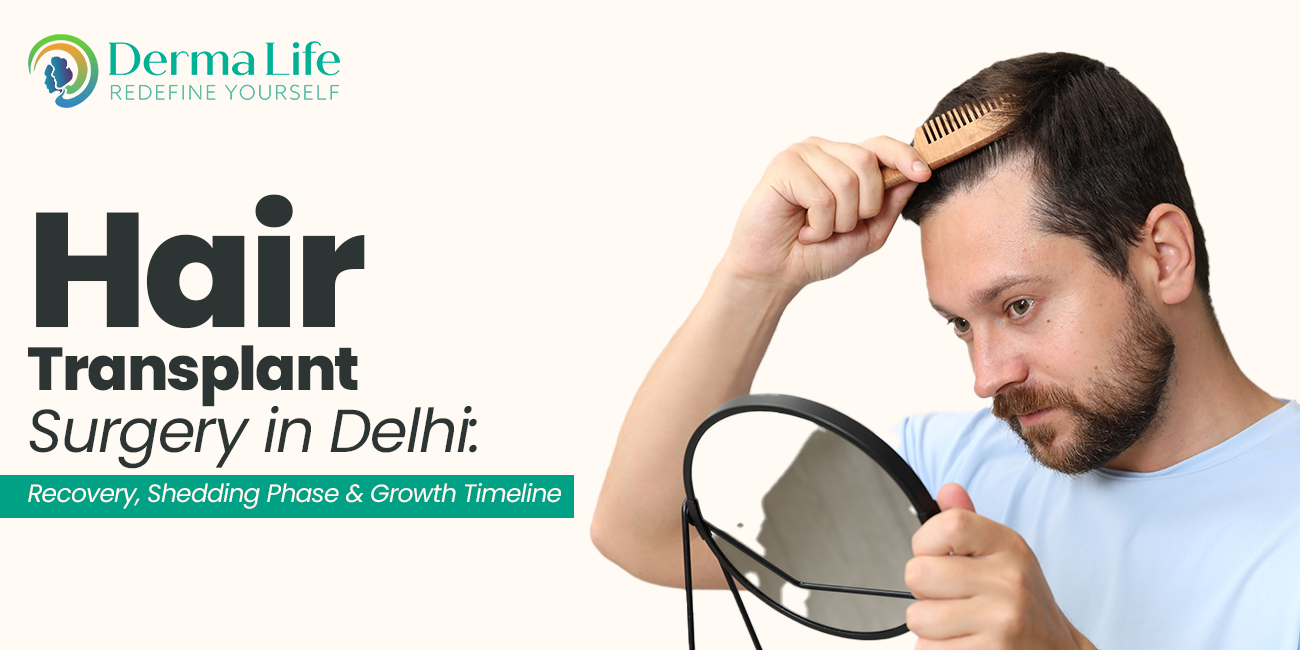Winter might be the season of celebration. But with the frosty mornings and chilly winds of the coldest months, there come numerous complaints regarding hair fall in winter. Besides the drying skin and lips, winter brings scalp and hair issues. While you may think the dry weather cannot result in hair loss, certain evidence proves that hair fall in winter is common.
If you are battling hair fall during winter, this post is for you. Welcome to this all-encompassing guide, where you can learn about winter hair fall, how to stop hair fall, and more.
| Do you know? On average, losing 50 to 100 hairs a day is considered normal. However, factors such as age, genetics, health conditions, and hormonal changes can influence hair loss patterns. |
Hair Fall In Winter: Ins and Outs
Does hair fall during winter increase? Well, even people with the healthiest hair experience crucial challenges during winter. For some, hair fall during winter is a common issue. The air dries out during winter, which leads to scalp and hair problems for some people.
Due to the dry atmosphere around you, the scalp loses moisture. As a result, you experience dandruff, dull skin, and breakage. In short, winters make your scalp extremely smelly and itchy. Increased dandruff contributes to an increase in hair fall.
Those cotton scarves and woollen beanies can keep your head warm during the winter. But do you know they can even cause excessive friction? That might result in hair loss. Your hair comprises hydrogen bonds, which in winter weakens and results in breakage, split ends, and dry hair.
So, if you want to discover several ways on how to stop hair fall in winter, you must learn the reasons beforehand.
What Makes Winter Hair Fall Common?
Winter hair fall is quite common due to dehydration of your scalp. Dry hair and scalp may cause thinning, hair loss, and even breakage. The following might be the prime reasons to experience hair loss during the colder season of the year:
-
Scalp Dryness
A prime reason for winter hair fall is the dry scalp. Indoor heating and cold air may deplete the moisture from the scalp, which causes flakiness, itchiness, and irritation that might weaken your hair follicles, which contribute to hair shedding.
-
Hat Hair
Undone wavy hair and loose curls would look great under the cap. But the shapeless, flat, and static hair may wreak havoc on your winter hairstyle. Of course, you would wear beanies and hats to keep yourself warm during winter.
But that may result in a condition: hat hair. In short, hat hair may occur when moisture and sweat get trapped under the hat, which allows the bacteria to thrive. That might weaken your hair and lead to hair fall.
-
Lack of Sunlight
Winter brings shorter days with less exposure to the sunlight. The sun’s ultraviolet rays are essential for producing Vitamin D, which is responsible for strengthening hair follicles. In addition, it promotes healthy hair growth and makes them less prone to hair loss and breakage.
A Vitamin D deficiency results in hair shedding, which leads to brittle and weak hair, which is more prone to damage.
-
Dietary Changes
Hair fall in winter might be caused due to various dietary parameters. The winter weather demands heavier and more comfortable food consumption. As a result, people neglect the consumption of the essential nutrients. So, a poor diet results in brittle and weaker hair, which is one reason for hair loss.
Hair Loss in Winters: Steps to Undertake to Reduce Winter Hair Fall
If you want to beat the winter blues and keep your hair healthy, there are different ways to do so. On that note, here’s a list of steps on how to stop hair fall in winter.
-
Keep Yourself Hydrated
The worst part of the cold season is that the winter air dehydrates your scalp and hair too easily. Dry hair is susceptible to brittleness and breakage. So, you must ensure you drink the required amount of water to stay hydrated.
-
Use A Mild Shampoo
Shampooing is an important regimen, especially during winter months. But remember one thing: Over-shampooing your hair during the cold season can lead to excessive dryness. It washes out the natural oil that contributes to excessive hair loss. Use a mild shampoo and wash your hair twice or thrice every week.
-
Moisturizing Your Scalp Using a Conditioner
Thinking that shampooing is enough to make your hair look voluminous and dense is a myth. You need to invest in a good conditioner. Even if you wash your hair in lukewarm water, make sure you condition your hair using cold water only. When you condition your hair with hot water, it may eliminate natural oil.
Remember, conditioning is a significant task you cannot skip after shampooing. A decent conditioner seals in moisture and prevents frizziness and dryness. Don’t forget to condition the ends too.
-
A Good Oil Massage
A warm hair massage works wonders during winter. You can use cold-pressed argan, olive, or coconut oil that nourishes and strengthens hair roots.
Alternatively, you can use one tablespoon of cold-pressed castor oil, combine it with two tablespoons of coconut, and massage your hair in a circular motion. Leave the oil for about an hour or overnight before shampooing.
-
Trim Your Hair Every 6 to 8 Weeks
Does hair fall increase in winter, even with regular trimming? Although this varies from one person to another, regular trims (6 to 8 weeks) can help prevent split ends and breakage. It keeps your hair healthy and more manageable.
-
Devote to a Balanced Diet
Your dietary practices have a lot to do with your hair goals. So, you need to consume a balanced diet that is rich in minerals and vitamins. Besides promoting hair growth, it ensures reduced hair fall during the cold season.
-
Don’t Overuse Heat Styling Products
You also need to minimize heated styling tools like curling irons and straighteners. Also, limit the use of curl quenching creams and gels that are readily available in the market. Heat dries out hair, making it more prone to breakage.
-
A Silk or Satin Bonnet or Scarf While Going to Bed
Your good night’s sleep becomes more peaceful when you wear a silk bonnet. Even a silk scarf serves the purpose effectively. What it does is reduce friction and prevent breakage. If you want, you can buy a silk or satin pillow cover. The benefits of silk go beyond words. One noteworthy advantage of this material is that it is gentle on your hair, so it can retain moisture.
Silk or satin can also reduce hair friction, thereby making your hair look less frizzy and resulting in healthier and smoother hair. Silk and satin have a texture that benefits people with curls and coils.
-
Take Professional Guidance
The winter season brings forth hot cocoa, holiday festivities, and your favorite cozy sweaters. However, increased hair fall may dent your confidence, thereby causing an emotional and mental breakdown. It’s a different story if you have developed well-defined male/female pattern baldness due to genetic factors.
Related Blog- भारत में बाल प्रत्यारोपण का खर्च – हेयर ट्रांसप्लांट कॉस्ट
In such circumstances, your medical professional may advise you to undergo hair restoration surgery. You can discover whether you are the right candidate for a hair transplant in Delhi. Alternatively, despite the above efforts, if your hair fall does not reduce, it is time to get in touch with a professional. The expert can diagnose your condition and suggest treatments, you can consult Dermalife’s expert to get high-quality hair loss treatment in Delhi.
With the right attention and care, you can maintain your lustrous locks during the colder months. Now that you know how to fight hair fall in winter, embrace the goodness of the season with utmost confidence.
Hair Loss/Fall in winter- Reason & Prevention Steps





